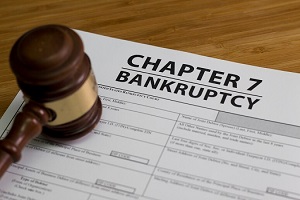How To Prepare For A Foreclosure On The Rise
What Is A Foreclosure?
Foreclosure is a process where somebody who has a lien against a property, usually it’s a mortgage lender but it can also be an HOA, a home equity line of credit lender, or your property taxes.
It’s a process where they try to take repossession of the property and it only happens with real estate, it doesn’t happen with personal property with foreclosure.
Can foreclosure affect businesses?
It can happen with any kind of real property; it doesn’t have to be just residential, it can be commercial as well.
A client recently had four judgment liens against his commercial property, it was a warehouse and the third in line that he owned the most money to was starting a foreclosure process.

Are There Different Types Of Foreclosure?
There are different types of foreclosure, and there are different entities that can initiate the foreclosure.
It can be your mortgage lender, it can be your HOA or your COA, it can be property taxes, if you have a Home Equity Line of Credit or a Heloc, and there are judicial foreclosures.
One method where the lender will go to court and ask for a court order allowing them to take repossession of the property and judicial foreclosure is not quite as common in Texas as a non-judicial foreclosure makes sense judicial foreclosure.
It only happens with property taxes and HOAs.
Non-judicial foreclosure is the other kind and a non-judicial foreclosure bypasses the whole court system, and only happens with people who hold a deed of trust and have that particular clause in the deed of trust that you signed when you bought the property.
How Does A Foreclosure Process Start?
Usually what happens is it starts with some kind of breach in the contract you have you’ve fallen way behind on payments, that’s the most common one.
It is some kind of breach if you signed your loan, that says that you’re going to be a resident in the property and you’re using it as a rental property, that can be another breach of the contract but for our purposes, we’re talking about someone who’s fallen behind on mortgage payments you were laid up, you had Covid, you couldn’t make your mortgage payments for a while, and then the mortgage lender comes back and says we’re going to start foreclosure.
The first thing that happens is that the very by-law they have to do is that they have to send you a Notice of Defaults, and they’ll send it by registered mail.
Sometimes that notice of default is also called a notice of breach, if it’s a notice of breach you have 30 days to do what they ask.
They will give you the date certain in the letter and what they’re asking you to do usually is to catch up on those mortgage payments.
If it’s a Notice of Default you have 20 days to “Cure”.
A cure is a term for catching up on those payments, so a notice of default or a notice of breach gets filed first, you have to have at least 20, sometimes 30 days to cure.
After that time has run then they have to post a Notice of Sale, they’re going to send that to you registered mail, they’re going to put it on your front door and the notice of sales says that they plan to sell your home or your commercial property at auction, you have to have at least 3 weeks before the sale date.
In those 21 days, you have some time to figure out what you’re gonna do.
In Austin the foreclosure sales take place on the first Tuesday of the month, so even if let’s say your notice of sale was the 30th of December then it’s too soon, you have to have to at least 21 days before the sale takes place, you have the notice of sale on the 30th of December, then your foreclosure sale cannot take place until the first Tuesday in February, so there you have more than 21 days but 21 days it’s the minimum.
Does foreclosure affect my credit report?
It will affect your credit report, whether it’s judicial or non-judicial. It gets reported on all three credit reporting agencies, and it will likely affect your Fico score, it will go down.
Unfortunately, it could also impact your ability to borrow money in the future, whether it’s for a home credit card or any other kind of loan that you want to get.
What Is The Best Way To Prevent A Foreclosure?
Prevention of course is to stay on time with your payments, if you’re able to, that’s the obvious answer, if you do find that you have fallen behind.
There are certain agencies out there that can help you cure, there’s one in the state of Ohio called Save The Dream, and you apply to this charity and they give you a certain if you qualify they give you the money to catch up on your mortgage payments.
That’s one option or if you have a wealthy uncle who can hand over that money for you curing, that delinquency in your mortgage payments is one way to stop the foreclosure in its tracks.
Something else that’s a very popular solution is to modify your loan, now this is different from a “Refinance”.
A Refinance is a whole new process where you apply.
You get the appraisal done on your property and it’s a brand new loan, a modification of your loan is done through there used to be modifications called Hamp.
Back in the major foreclosure days 10 years ago, different kinds of modifications are available through your lender, and if you’re in the process of modifying your loan under federal law then the lender cannot foreclose on the property while you’re in the modification process.
Where we step in is the third way to stop a foreclosure, you have to file bankruptcy and there’s the automatic stay, so the minute you file your bankruptcy all collection action including a foreclosure has to stop until the stay is lifted, either by court order or because you’re no longer in bankruptcy.
Bankruptcy can help buy you time or it can help you catch up on your mortgage payments.
Do I Need A Lawyer For A Foreclosure?
It’s always a good idea to get good legal advice if you’re doing the modification route.
There are companies and some of them are scams and some of them are completely valid and will help walk you through the modification process.
If you are very well organized, you keep great records, you make a copy of everything that you mail out, then you can probably do the modification on your own and save yourself some money.
It’s a very clear checklist of documents they need, that being said mortgage companies are notorious for being extremely picky, if say you were missing a page in your bank statement then they’re going to deny the modification, or they’re going to say that they need another document, and while you’re getting that other document they need updated pay stubs, and it’s just back and forth forever.
Usually, if you’re pretty organized you can get everything on that checklist, it’s 100 accurate, you get it into them on time, you have a record that you have mailed it, how you’ve mailed it, the date you mailed it, you’re probably going to be okay to save yourself some money and not use an attorney, but if you need a little bit of help getting organized it might be a good idea to talk with a reputable attorney who can help you get that modification through.
Is Chapter 7 Or Chapter 13 Better For Foreclosure?
There are so many different kinds of bankruptcies but we’re going to look mainly at Chapter 7s and Chapter 13s.
Your bankruptcy attorney is going to ask you what your goal is, are you looking for a way out from under this house that’s too expensive, and you just want to be able to walk away from it.
If that’s the case then Chapter 7 might be best for you depending on a million other factors, but Chapter 7 would let you walk away from the house and not own anything else on it if however you do want to stay in this property, this is where you raise your kids and it makes sense for you to stay and you can afford it now after a period of not being able to make your mortgage payments.
Chapter 13 which is a restructuring of debt that might make a lot more sense, one of the reasons besides the fact that we’re bankruptcy lawyers, is that we prefer the bankruptcy route over a modification, is that in a modification they will take whatever your rearrange on your mortgage payments and wrap it back into the loan, so essentially you’re paying interest on that arrearage and they usually extend the loan from 30 years to 40 years.
For example, in Chapter 13 you have a period to catch up on that mortgage arrearage at zero percent interest, so you’re not paying interest on that.
If you’re able to make a Chapter 13 plan payment where you stay current on your mortgage and you have up to 5 years to catch up on that mortgage or marriage then you’re doing that at zero interest and you’re all caught up in five years so that might be the better route for some people
Why Are Fewer People Asking For Bankruptcy During The Pandemic?
For 2 years now the bankruptcy community has been saying: okay the wave is going to hit all, we’re going to be seeing all these bankruptcies just like we had 10 years ago, we’re just really going to everybody get ready, and then the numbers keep going down and down and down.
Bankruptcy is as much a financial decision as it is an emotional or psychological decision, people are there, it’s a lot of emotion attached to bankruptcy, so when people are in debt and they’re struggling, sometimes they’re just too overwhelmed.
There’s often depression and anxiety that go along with people who are deeply in debt, and feeling that overwhelms sometimes makes it hard for them to take that first step, to get some help, to get out from under that debt.
Another phenomenon that we saw is that at the beginning of the pandemic households somehow were able to just shred their debt, they took a lot of that debt and paid it down.
A lot of that has to do with the federal pandemic helping state local relief, the moratorium on evictions, the moratorium on foreclosures if you don’t have to make your house payment, maybe you’re going to pay off that credit card so that you’re in better shape.
Down the road we know that bankruptcies are usually the trend, there’s like a two-year lag so people file bankruptcy when they have a lot of consumer debt if you’ve been able to pay down your debt through the pandemic with the relief that was offered, you’re not going to be as overwhelmed, another thing that might be happening is that people cannot afford a lawyer, it’s not free to file bankruptcy.
Sometimes people who are overwhelmed just can’t afford a lawyer and then, another factor that might be happening is that a lot of bankruptcy lawyers have stopped being bankruptcy lawyers, they’ve moved their practice more towards domestic relations and family law or they’ve leaned heavily on a collections practice very well, but several bankruptcy lawyers have said this is the time to retire, this is the time to change my practice because the numbers are so so down from 10 years ago.
Misconceptions About Foreclosure
There’s this shame and we hear it all the time, that there’s this idea that people who unquote walk away from their homes, or go into foreclosure, that there’s just this: Oh my gosh how could they have possibly renamed this obligation! They signed those papers and they have to repay it, and then when we hear: How could they just walk away from that house? You made that promise, well okay what if I told you that the primary breadwinner died of Covid? or what if I told you that they became suddenly disabled or had a stroke or some kind of something? That was out of their control.
Everybody deserves the dignity of some kind of relief, you shouldn’t have to be tied to a property for all eternity, and then have all kinds of catastrophic things happen.
The primary misconception, like all misconceptions having to do with bankruptcy, is that it’s some kind of moral failing, that you’ve fallen behind and the devil got you, and how dare you, but there are workarounds and people aren’t happily walking away from anything.
Before 68% of bankruptcies are filed because of medical debt, and having a medical catastrophe or even an ongoing medical issue that you have is not a moral failing, nobody asked for that, nobody made some poor decision down the road and then decided they were going to get cancer, so it is because of the overwhelming statistics that it’s medical debt that’s driving a lot of the bankruptcy.
No one should feel bad if some kind of medical event or any event or unemployment caused them to fall behind on their mortgage payments, and they’re facing foreclosure, everybody deserves a roof over their head.
Can a property be redeemed after foreclosure?
Redemption only happens after the auction has taken place, and it’s only available in property taxes and HOA situations, those things we call judicial foreclosures before you have 180 days, and you would be able to redeem the property by making all of the payments catching up, paying their attorneys fees, paying all the costs, etc.

It’s going to be more than probably what most folks expect, but with property taxes and HOAs, yes, you have 180 days after the auction to be able to redeem the property and 180 days which are six months.
Do I still owe money after foreclosure?
It changes state by state, for example in the state of Washington which also has non-judicial foreclosures for mortgage holders just like Texas, in the state of Washington they cannot come back for.
If it’s your first mortgage and they’re the ones that do the foreclosure, they can’t come back for that money that’s owed after the foreclosure.
In Texas, however, you can, it’s called a deficiency balance, so let’s say your home is worth 100K and they sell it at auction for 100K, but you owe 150K on it.
The mortgage lender can come back and say: you know that 50K that we didn’t recuperate, we’re coming to you for that, so that deficiency balance can follow you around, that’s something that can be discharged in a bankruptcy.
Does Bankruptcy Also Extend To My Spouse?
It depends on the type of bankruptcy, Texas is a community property state, so if even if the mortgage is just in your name, let’s say the wife holds the mortgage because of the community property status of Texas, then the husband still has a legal obligation on the mortgage, even if it’s only in the wife’s name, so no matter what both spouses have the debt.
If just one spouse is filing for bankruptcy, the other spouse is considered a co-debtor.
They might not be filing with them, but one spouse is filing.
In a Chapter 7 bankruptcy let’s say you want to walk away from the house, you want to walk away from the deficiency balance so you file a Chapter 7 for just a completely fresh start.
There is no co-debtor protection, so if you and the wife are filing bankruptcy, your husband could still be on the hook and pursued by the lender for that debt, Chapter 13 is different.
Chapter 13 which is a restructuring you would make a monthly payment that’s calculated with various factors Chapter 13 has co-debtor protection, so whether it’s your spouse who also you know has an obligation on that loan, whether you co-signed on your child’s car, they’re a co-debtor with you.
In all kinds of situations where you have shared debt Chapter 13 will protect the other non-filing individual who also shares that debt.
Share This Story!
& Let’s Discuss How We Can Best Help Eliminate Your Specific Financial Struggles!





